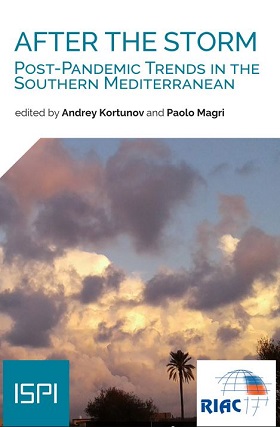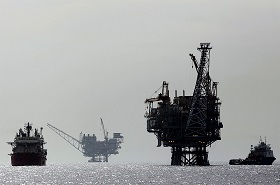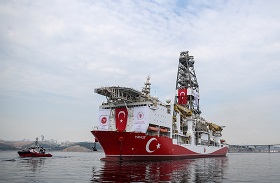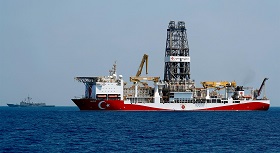Recently, and particularly in 2019–2020, scholars have been increasingly focusing on the Eastern Mediterranean owing to its importance for global transport routes and its growing energy potential. The energy sources in the Levant basin raise the legitimate question: which approach will prevail? Shall we see cooperation in conflict resolution and in promoting collective security, based on joint building and development of the fields, or shall we see competition destined to exacerbate a situation already fraught with conflicts?
Development of the Fields and Plans for Transporting Resources to Global Markets
The Eastern Mediterranean sub-region is at the juncture of Africa, the Middle East, and Europe, which both makes it hostage to old overlapping conflicts and opens up certain opportunities. It is important to remember that gas reserves in the Mediterranean shelf discovered in the XXI century total over 3.8 trillion cubic meters. The key fields are Zohr off the coast of Egypt, Tamar and Leviathan off the coast of Israel, and Aphrodite off the coast of Cyprus, etc. Additionally, the so- called Block 9 is in a part of the field disputed by Lebanon. We can suppose there are large gas reserves off the Syrian coast, as well. By 2020, development had already been launched on several fields but, on the whole, both this process and its implementation are proceeding in fits and starts since matters have to be approved and agreed between unstable governments and oil companies, and also between states themselves, in the absence of demarcated maritime borders.
For decades, most states of the Levant Basin have imported gas and oil. The Egypt-Israel collaboration in the energy sector exhibits a curious dynamic. Currently, these two states have made the greatest progress in developing gas fields in the Eastern Mediterranean. In 2015, Italy’s Eni discovered the gigantic Zohr field in Egypt, a major Arab state, which allowed Cairo to break the vicious circle of its dependence on imports and to cover its own demand for gas. Egypt now produces about 311 million cubic meters of gas and 700,000 barrels of oil daily (from the deposits in the Western Desert adjacent to Libya). However, in January 2020, gas production also started on Leviathan, the largest field in the Levant Basin located on Israel’s stretch of the shelf, and this marked the start of deliveries of Leviathan-produced gas to Egypt. Noble Energy, which develops Leviathan, contracted to deliver gas to Egypt back in 2018. Noble Energy purchased 10% of Eastern Mediterranean Gas Company, which owns the gas pipeline running from Ashkelon in Israel to El-Arish in Egypt (about 90 km). Even though Egypt has no particular need for gas imports, it is striving to create a gas hub. Egypt is planning to receive gas from neighbouring states, liquefy it at the Egyptian LNG plant (Idku LNG with a capacity of 7.2 m. tonnes a year), and sell it on global markets, sending it by tanker to Europe or Asia.
Egypt’s interests have taken this turn since it has had fewer problems developing and selling its own natural gas, while the situation is somewhat more complicated for Israel. Development of the Tamar and Leviathan gas fields has slowed down owing to the technically challenging gas production process, the high market price of the gas (which makes it difficult to find buyers), and domestic political and regional instability stemming from maritime border demarcation issues.
To settle matters related to the above-mentioned Block 9, Israel engaged in talks with Lebanon on demarcating the maritime border, a historic event in the two states’ bilateral relations. Lebanese officials made every effort to emphasize that these talks were purely technical. International companies are certainly interested in the success of these negotiations; the Total- Eni-Novatek consortium has signed a contract for exploration in Block 9. Despite claims that their talks are exclusively technical, both Israel and Lebanon need these negotiations. For Israel, they will mark another success in gaining regional recognition of its rights while, should development of the gas fields prove successful, they will afford Lebanon a special opportunity to attract additional investment. The gas produced could come in handy for both domestic consumption and exports, which together would constitute an important boost to the crisis- stricken Lebanese economy.
Transporting the gas to Europe demanded that Cyprus be involved. This once again raised the predictable issue of Cyprus and prompted a response from Turkey (which we believe to be somewhat belated). In the course of time, Israel succeeded in securing the support of Egypt, Greece and Cyprus. The latter two states need to be involved for two reasons: the Aphrodite deposit was discovered off the coast of Cyprus and there is also the matter of transporting the Levantine natural gas to Europe. This question has produced the principal frictions concerning the Eastern Mediterranean. The plans to build a pipeline to Europe have not been implemented yet; however, on 2 January 2020, Greece, Cyprus and Israel signed a treaty to construct the 1,900-kilometre EastMed gas pipeline. This question is claimed to be of interest to both Europe and the U.S. as mitigating the risks of dependence on Russian gas (see below for further details). Construction of the gas pipeline with a capacity of 10 billion cubic metres a year is expected to take approximately seven years.
Revitalisation of Ankara’s foreign policy and regional competition in the Eastern Mediterranean While other states in the Eastern Mediterranean (Israel, Egypt, Cyprus, Greece and, to some extent, Lebanon) have attempted to form alliances around the energy sector and gas exports, Turkey has remained on the sidelines. Nevertheless, both the regional reconfiguration and the domestic perturbations that affected Turkey in 2016 after the attempted military coup resulted in Ankara taking more active political steps and shaping its own policy in the Eastern Mediterranean. Before 2016, Turkey strove to apply the “strategic depth” concept formulated in the 2000s by the state’s Foreign Minister and Prime Minister Ahmet Davutoglu. Following his resignation in May 2016, and particularly after the attempted military coup, Ankara began to steer a course toward developing a new strategy and becoming actively involved in its neighbours’ affairs.
As a result, Turkey began to drift away from the “strategic depth” concept and toward a policy that is more independent of its traditional partners and also favours tactically advantageous cooperation and going back to using “hard power” … Back in 2006, Turkish Admiral Cem Gürdeniz introduced the “Blue Homeland” (Mavi Vatan) doctrine as part of Turkey’s maritime strategy; Gürdeniz is considered to be one of the principal architects of Turkey’s current policy in the Mediterranean and of the ideology of demarcating the borders with Libya.
The agreements Turkey and the Libyan government concluded in late 2019 resulted from a bilateral Ankara-Tripoli arrangement achieved with complete disregard for other actors and for the 1982 Convention on the Law of the Sea. Since Turkey is not a signatory to that Convention, Ankara believes it had the right to shape its own bilateral relations, which also implies larger sea spaces for Turkey. Sooner or later, this approach by Turkey will inevitably come up against growing discontent on the part of other states. In this respect, much depends on whether Turkey will make concessions and cut a deal to retain some benefits, or whether it will risk escalating tensions, sanctions and serious economic problems. Turkey’s revitalised policy is reaching its limits. In fact, this policy, pursued as part of Turkey’s “Blue Homeland” doctrine, stems from Ankara’s own missed opportunities. We can expect Turkey’s revitalised policy in the “post-Ottoman” space to peak in late 2020 in the face of the discontent of other actors. It is now crucially important for Turkey to reach a regional consensus with the other states of the Eastern Mediterranean.
The Eastern Mediterranean sub-region has laid bare rifts in adjacent regions: Europe and the Middle East. As far the European dimension is concerned, we are observing a rapprochement between Italy and Turkey while France is building up its military presence in the sub-region and countering Turkey’s objectives. As far as the Middle East is concerned, strife and regional competition are building up between Qatar and Turkey on the one hand, and the United Arab Emirates (UAE), Saudi Arabia and Egypt on the other. The establishment of relations between the UAE and Israel might also entail additional risks for Eastern Mediterranean stability, since the two states’ interests are currently rather convergent and contrary to Ankara’s ambitions in the sub-region. Both Israel and the UAE have a high degree of confidence in Washington and their lobbying potential there. This could deliver a powerful blow to U.S.-Turkey relations, already severely tested in connection with the Syrian Kurds and Fethullah Gülen, the Turkish preacher accused of instigating the 2016 attempted military coup in Turkey.
In these circumstances, the rift within NATO takes on a different hue. So far, truly dangerous developments between France and Turkey, locked in a conflict in the Eastern Mediterranean, have been prevented by NATO having “arbitrators” in the U.S. and Germany. Nevertheless, it appears that joint efforts by NATO’s key members and Russia could create opportunities to develop mechanisms for preventing the situation from deteriorating further and tensions from escalating.
Old resolved conflicts in the sub-region overlap with both revived and new problems. For instance, provided local actors adopt an appropriate approach and external actors focus their attention on the sub-region, the energy sector could form the basis for a future regional security architecture; currently, however, these matters are only exacerbating the regional predicament. As they overlap with the traditional Israeli-Palestinian, Greek-Turkish and Cyprus questions, these developments are encouraging escalation and further competition.
The Global Dimension: The U.S. and Russia in the Eastern Mediterranean
A competitive foundation for international relations is currently solidifying in the Eastern Mediterranean. There are no expectations of a cooperative approach, since one party or another will always have greater ambitions and will attempt to implement exclusion policies. Russia and the U.S. are the key external actors interested in the region’s stability, so it would be expedient for them to work out joint crisis-prevention solutions.
For the U.S., Israel’s security and an Israeli-Palestine settlement, as well as support for NATO’s infrastructure and bodies, remain the key issues in the Eastern Mediterranean.
The latter is particularly important for Americans because they view the Eastern Mediterranean as NATO’s naval gateway to the Black Sea. This approach by the U.S. is destructive for other actors globally and for those directly involved in security issues in the Eastern Mediterranean. Given the serious risks and the fact that the situation could get out of hand, the U.S. have therefore been prompted to recognise, at least at expert level, the need to work on technical deconfliction measures in this part of the world. This requires finding a way to untangle the Cyprus, Libya and Syria questions.
As for Russia’s policy in the Eastern Mediterranean, we should recall Russia’s Minister of Foreign Affairs Sergey Lavrov visited Damascus and Cyprus in 2020. Mr. Lavrov emphasised that escalation was inadmissible and called for peaceful resolution of the contradictions through dialogue. Bilateral and multilateral dialogue, UN mechanisms, and international law should bring the parties to de-escalate tensions. Russia’s Foreign Minister also said Moscow was ready to act as a mediator should it be necessary. Russia is particularly concerned about the Syrian and Libyan part of the Eastern Mediterranean since Russia has maintained a military presence in Syria since 2015. By 2020, the world had seen the violence in the Syrian crisis abating but, in 2019–2020, both Lebanon and Syria’s economic situation deteriorated steadily and man-made disasters and large-scale wildfires occurred. People’s lives and the overall humanitarian situation were badly affected by the political elites’ inability to settle the crises and by European and American sanctions. Syria and Lebanon’s markets and currencies fell when the U.S. Congress adopted the so-called Caesar Act, a set of sanctions against Syria, and individual sanctions against Lebanon. Moscow, Washington and Damascus need to launch a serious political dialogue (not only at the level of the secret services) concerning the situation surrounding Lebanon and Syria. Further deterioration is fraught with new risks, especially for the neighbours of the two countries.
With no “honest broker” available in the Eastern Mediterranean, the risks of new regional clashes and problems increase. Some states practice a “bloc-based” approach to developing the fields and transporting gas; there are long- standing conflicts (the Cyprus question, the Palestinian question); there are no diplomatic contacts between individual regional actors (for instance, between Turkey and Egypt, between Turkey and Syria); all these factors exacerbate mistrust and undermine regional security. The Eastern Mediterranean states are committed to resolving economic interaction issues through dialogue provided there are one or more independent actors capable of taking various interests into account and finding solutions. Such a development would create an avenue for building confidence and could even result in collective security elements. (The European Coal and Steel Community played a role in the emergence of the OSCE, so a gas community in the Eastern Mediterranean could advance sub-regional integration and security). Given the U.S.’ interest in the region and the role it plays there, this issue could be put on the Russia-U.S. bilateral agenda with a view to achieving the most secure, acceptable and inclusive result.
First published in RIAC and ISPI Joint Report “After the Storm: Post-Pandemic Trends in the Southern Mediterranean”.








